Why do we study Science?
If ancient civilisations hadn’t observed the natural world, predicted real-world phenomena and aimed to explain the events around them then civilisation as we know it today probably wouldn’t exist. The world does not stand still and as our Earth continues to change we need to produce the scientists of tomorrow to confront the challenges ahead. A knowledge of Science provides the opportunity to help make a positive impact.
To help our students to meet this challenge our curriculum aims to provide students with the breadth and depth of knowledge to successfully complete higher education within Science related subjects and gain employment in Science related fields. Within our curriculum the students will develop an understanding of scientific investigation, from the equipment to be used, to the analysis and evaluation of results. They will develop their knowledge of the foundation scientific theories and link these theories to real world scenarios. Students will also gain an understanding of how Science filters into many of the other subjects they learn about and the world in which they live.
Ultimately, we strive to provide students with the opportunity to love science.
Science Read and watch list
Year 7-11
Year 7
Learning Outcomes
The Year 7 Science scheme of learning aims to build on knowledge developed at KS2, identify misconceptions held and allow students to reconstruct their understanding, whilst introducing new and interesting areas of Science.
Students learn about safety in the laboratory environment and gain a greater level of confidence when using Science equipment. Within each topic students are provided with the opportunity to develop their investigative skills through practical tasks and learn about the process involved in a practical investigation.
Students begin to identify how the knowledge they gain in Mathematics underpins the Science concepts they study from day to day in Science lessons.
Students also develop their cognitive ability and logical thinking through the ‘Concur Science Skills’ problem solving series of lessons which are completed throughout the academic year.
Topics Taught
Autumn Term
- Introduction to Science
- Cells, tissue, organs and systems
- Mixtures and Separation
- Energy
Spring Term
- Sexual Reproduction in Animals
- Acids and Alkalis
- Forces
Summer Term
- Ecosystems
- The Particle Model
- Sound
Year 8
Learning Outcomes
The Year 8 Science scheme of learning aims to further build on the knowledge developed at KS2 and in Year 7, again identifying misconceptions and developing students understanding of the world around them.
Students continue to develop their confidence when using Science equipment and understanding of scientific investigations. Students continue to identify how the concepts learnt in Mathematics lessons underpin the Science concepts they study from day to day.
Topics Taught
Autumn Term
- Food and Nutrition
- Combustion
- Light
- Plants and their Reproduction
Spring Term
- The Periodic Table
- Energy Transfers
Summer Term
- Breathing and Respiration
- Earth and Space
- Metals and their Uses
Year 9
Learning Outcomes
The Year 9 Science scheme of learning provides a transition from Year 7 and Year 8 to provide students with the core Science knowledge needed to explore and succeed at GCSE.
Students begin to use more technical practical equipment and a wider variety of methods to complete scientific investigations in the form of core practicals.
Students begin to explore complex levels of Mathematics in Science and apply these skills to the Science topics being covered.
Students increase their knowledge of Science vocabulary and how to apply the language of Science to exam questions.
Topics Taught
Autumn Term
- Microscopes and cells
- States of matter
- Methods of Separation and Purifying Substances
- Motion
- Enzymes and Nutrition
Spring Term
- Forces and Motion
- Transporting substances
- Atomic Structure
- The Periodic Table
Summer Term
- Breathing and Respiration
- Earth and Space
- Metals and their Uses

Year 10
Exam Specification
GCSE Science
Edexcel Specification
Biology
Chemistry
Physics
Learning Outcomes
The Year 10 Separate Science scheme of learning builds on topics covered at KS3 to prepare students for the breadth and depth of knowledge required for the Year 11 GCSE exams in Biology, Chemistry and Physics, as well as related courses and careers post-16.
Students complete Core Practical investigations which aim to develop a deeper understanding of how to carry out a Scientific investigation and how to use technical equipment with precision.
Students build on the Mathematics previously applied to Science in Year 9 with more challenging content.
Science knowledge gained across Year 9 and Year 10 is interleaved to allow students to remember more key content that has been previously covered in lessons.
Students further increase their Science vocabulary to cover the breadth and depth of the Separate Science GCSE course and develop their confidence to apply this language when answering exam style questions.
Topics Taught
| Autumn Term | Spring Term | Summer Term | |
| Biology | The Eye The Brain Genetics Natural Selection and Genetic Modification | Health Disease and the Development of Medicine | Plant Structures and their Functions Ecosystems and Material Cycles |
| Chemistry | Ionic Bonding Covalent Bonding Types of Substance Acids and Alkalis Calculations Involving Masses | Electrolytic Processes Obtaining and Using Metals Reversible Reactions and Equilibria Transition Metals, Alloys and Corrosion | Quantitative Analysis Dynamic Equilibria, Calculations Involving Volumes of Gases Chemical Cells and Fuel Cells Groups in the Periodic table Rates of Reaction Heat Energy Changes in Chemical Reactions |
| Physics | Waves Light and the Electromagnetic Spectrum Radioactivity | Astronomy Energy Forces Doing Work Forces and their Effects | Electricity and Circuits Static Electricity |
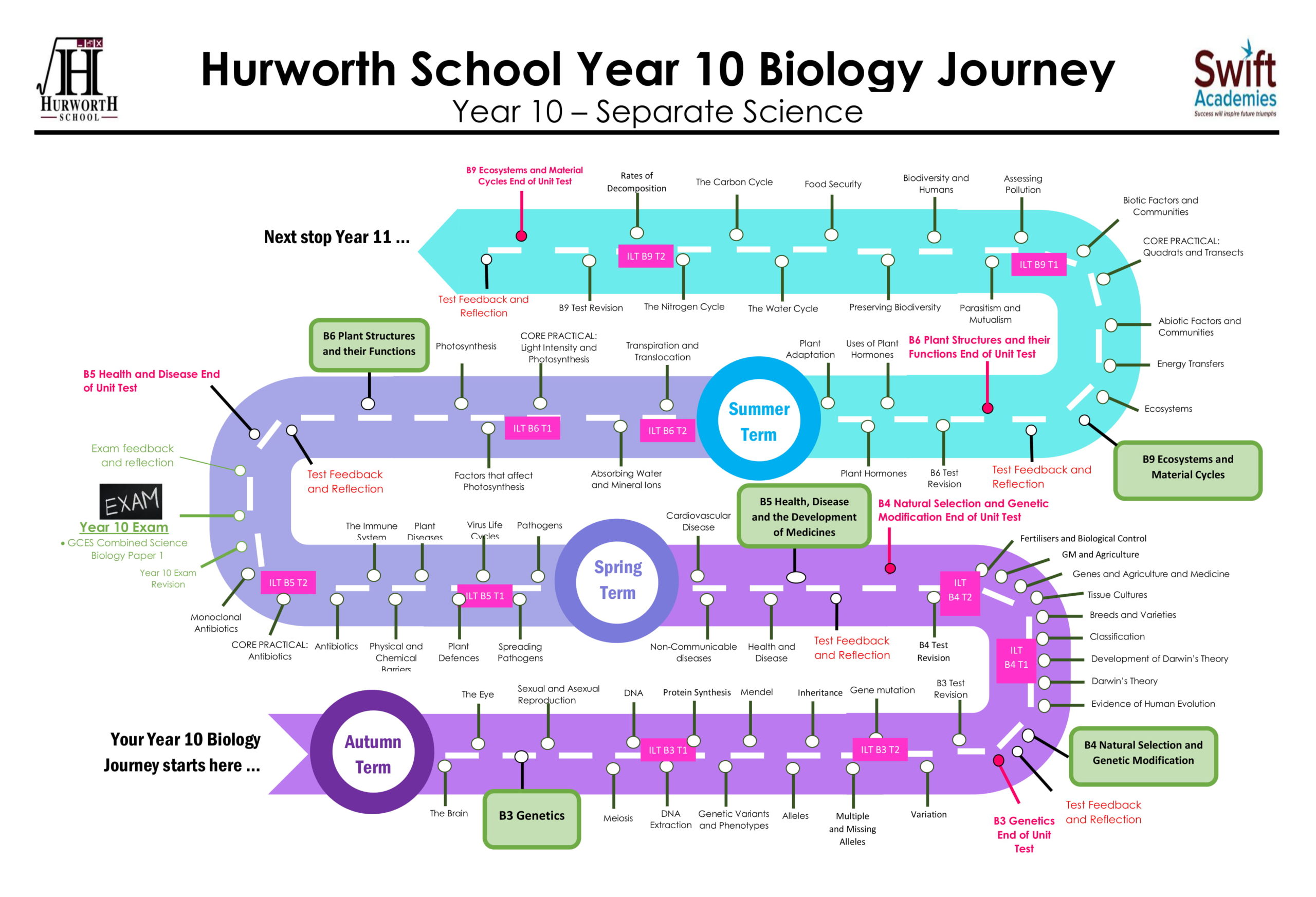
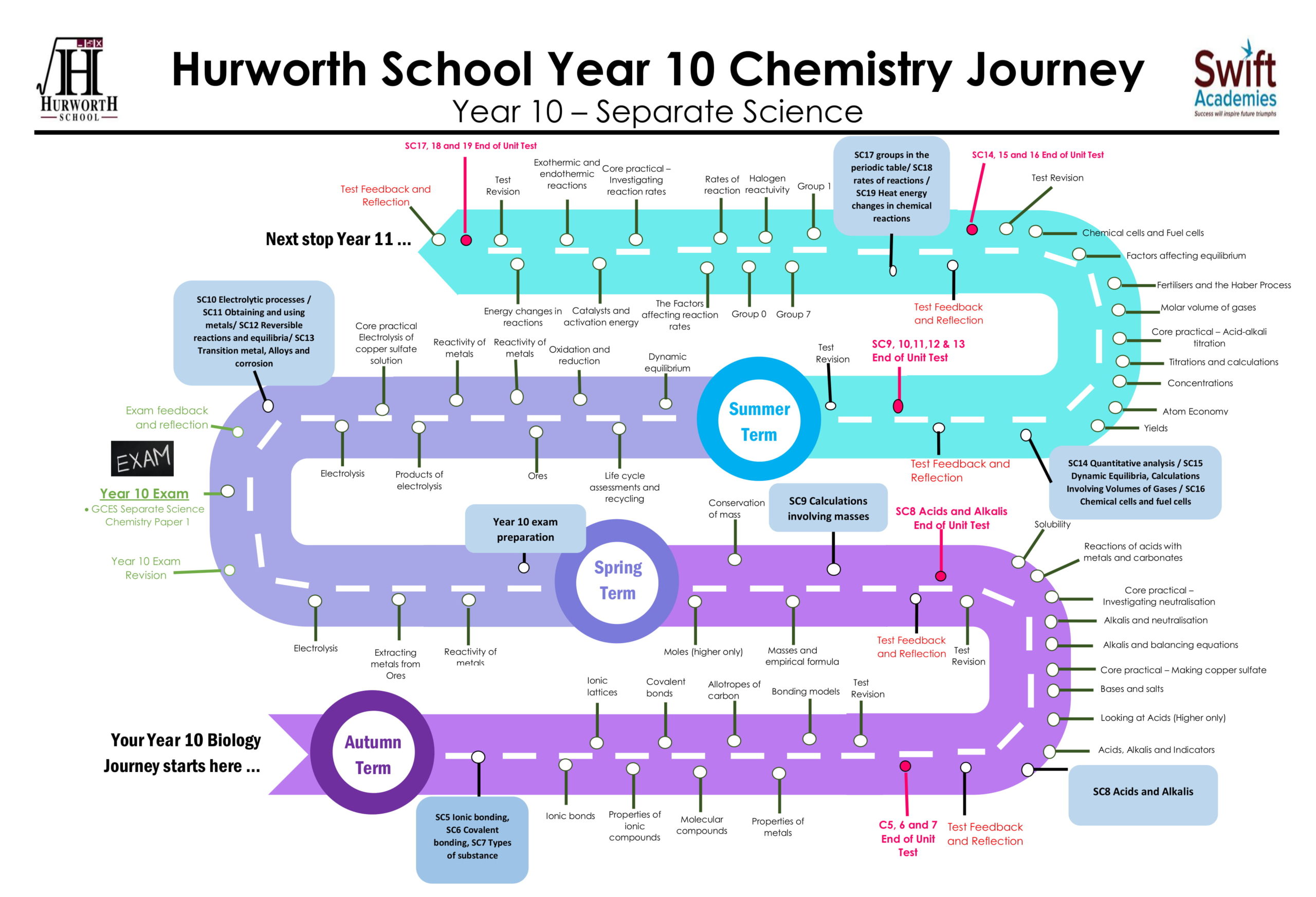
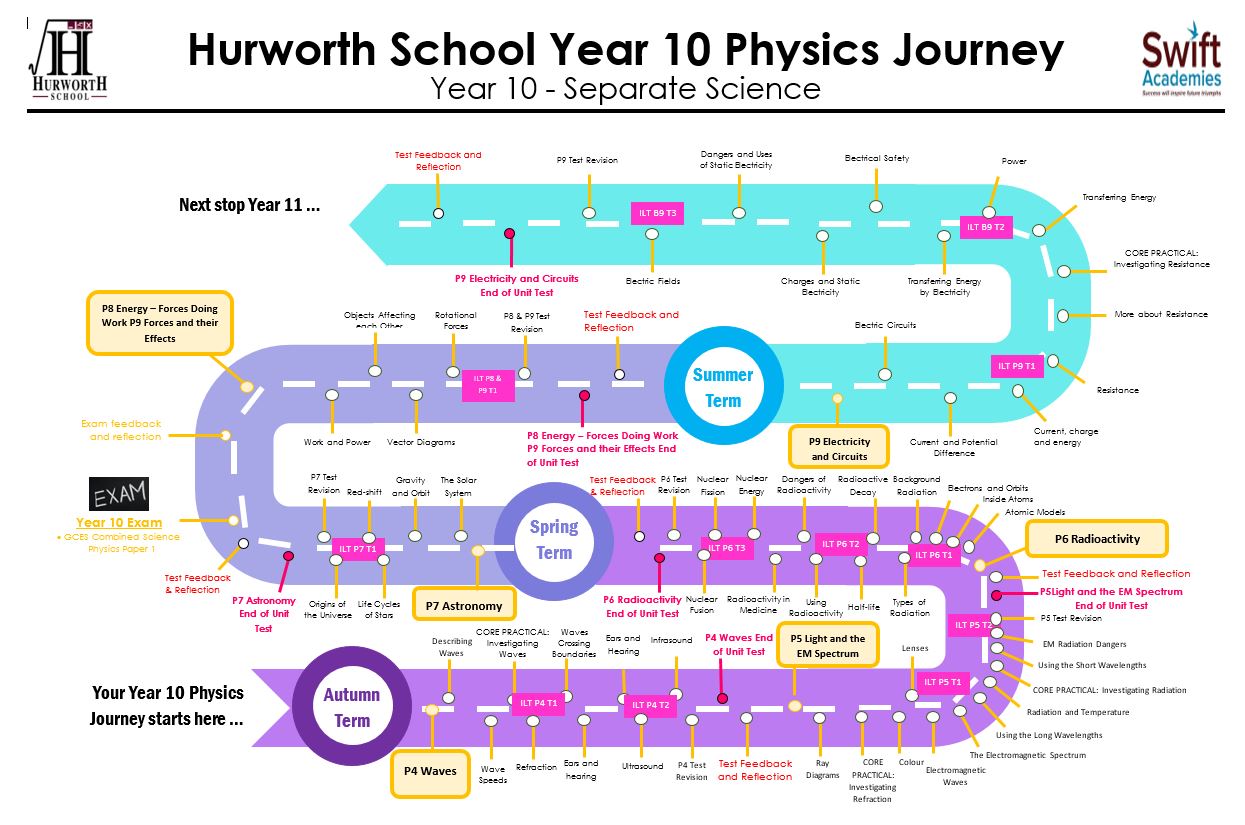
Year 11
Exam Specification
GCSE Science
Edexcel Specification
Biology
Chemistry
Physics
Learning Outcomes
The Year 11 Separate scheme of learning allows the students to develop their knowledge of the final topics to be covered before the GCSE examinations, revise the content covered throughout Year 9 and Year 10 and deepen their understanding of these topics further.
Students complete the final Core Practical investigations and develop a deep understanding of the core principles of carrying out Scientific investigations. Students aim to have a good understanding of the technical equipment which they have used and how to use this equipment with precision.
Students build on the Mathematics previously applied to Science in Year 9 and 10 with the most challenging content. The Separate Science scheme of learning progresses the students’ knowledge of the most complex Mathematics required.
Science knowledge gained across Year 9, 10 & 11 is interleaved to allow students to remember more key content that has been previously covered in lessons.
Students finalise their understanding of the required Science vocabulary to cover the breadth and depth of the Separate Science GCSE course and hone their confidence to apply this language when answering exam style questions.
Topics Taught
| Autumn Term | Spring Term | Summer Term | |
| Biology | Animal Coordination, Control and Homeostasis Testing food Year 11 Mock Revision Year 11 Mock Exams | Exchange and Transport in Animals Year 11 Mock Revision Year 11 Mock Exams | GCSE EXAMS |
| Chemistry | Magnetism and the Motor Effect Electromagnetic Induction Year 11 Mock Revision Year 11 Mock Exams | Qualitative Analysis: Test for ions Bulk and Surface Properties of Matter Including Nanoparticles Year 11 Mock Revision Year 11 Mock Exams | GCSE EXAMS |
| Physics | Magnetism and the Motor Effect Electromagnetic Induction Year 11 Mock Revision Year 11 Mock Exams | Particle Model Forces and Matter Year 11 Mock Revision Year 11 Mock Exams | GCSE EXAMS |
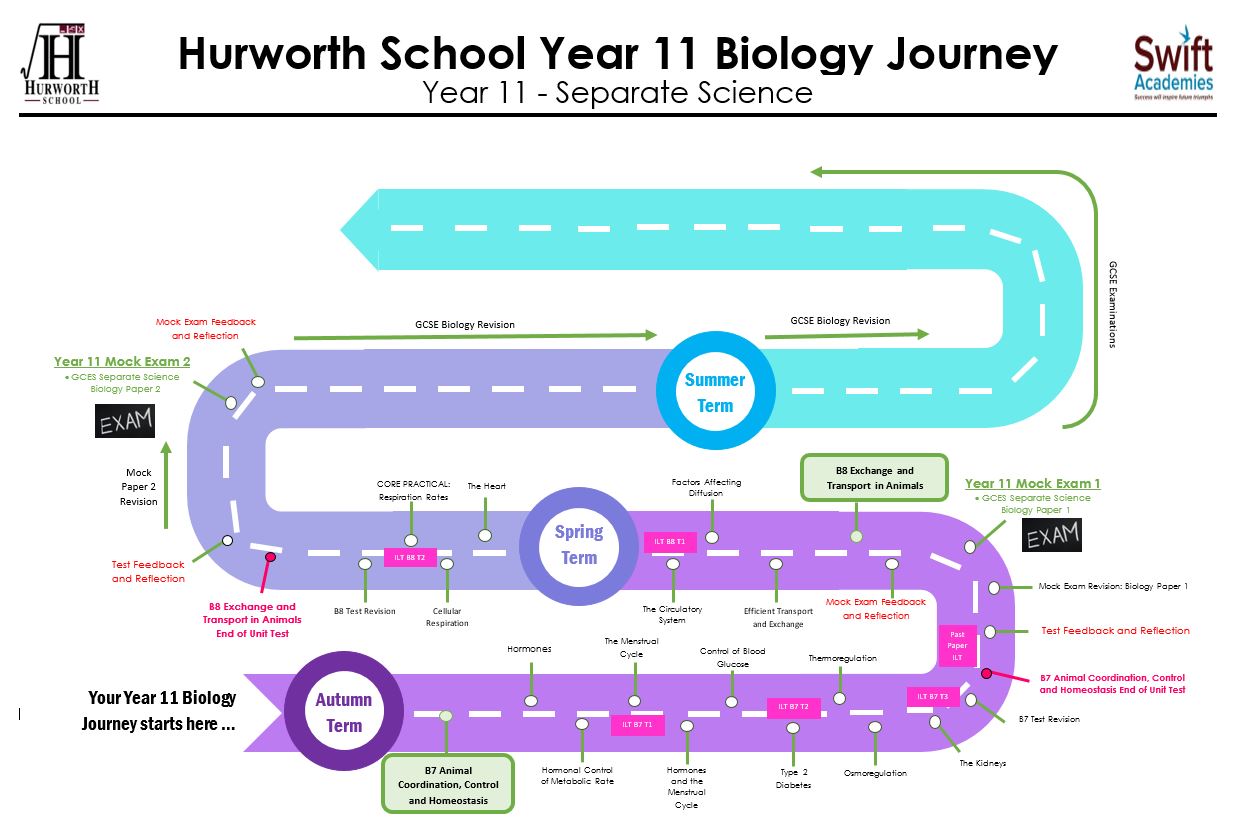
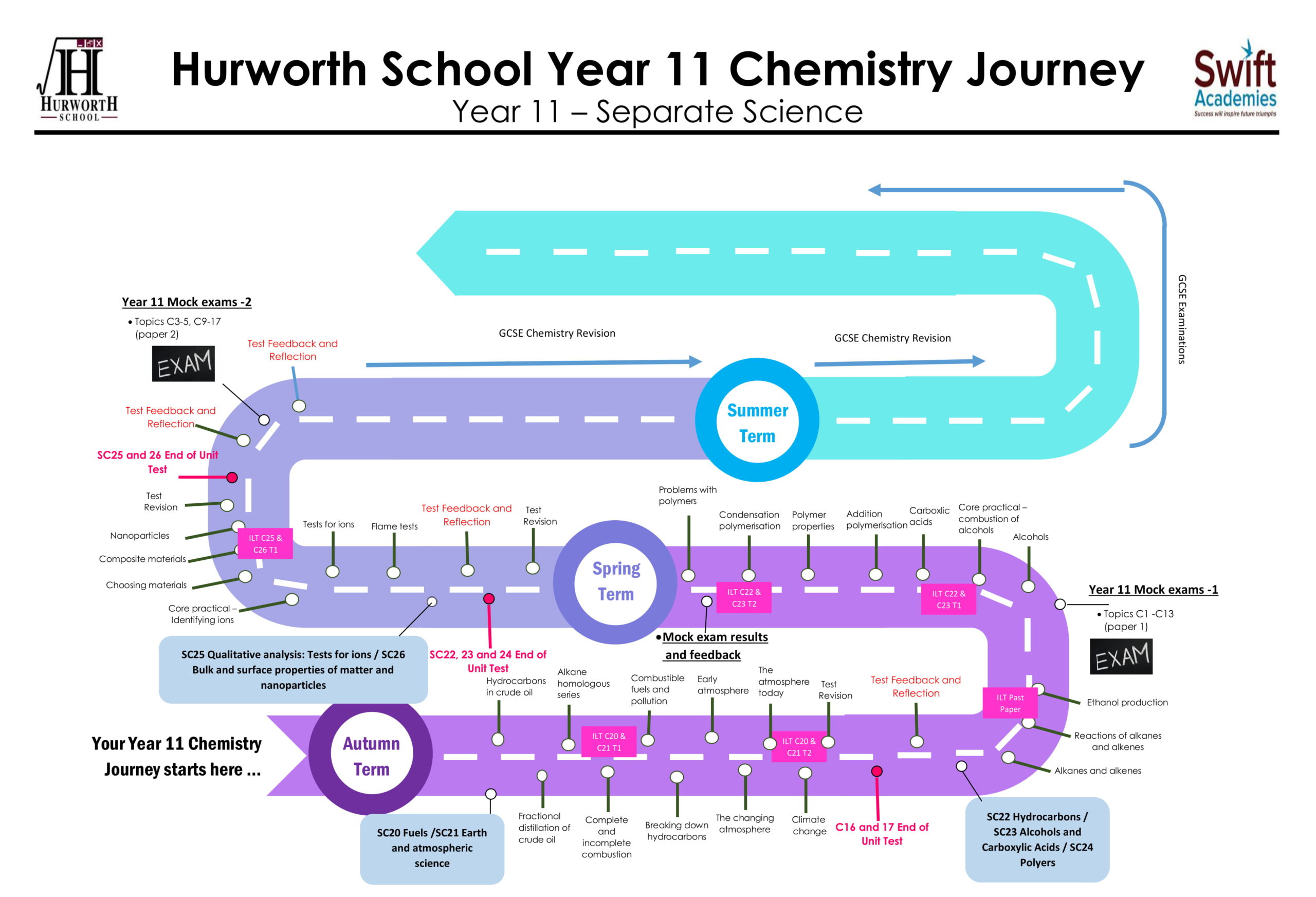
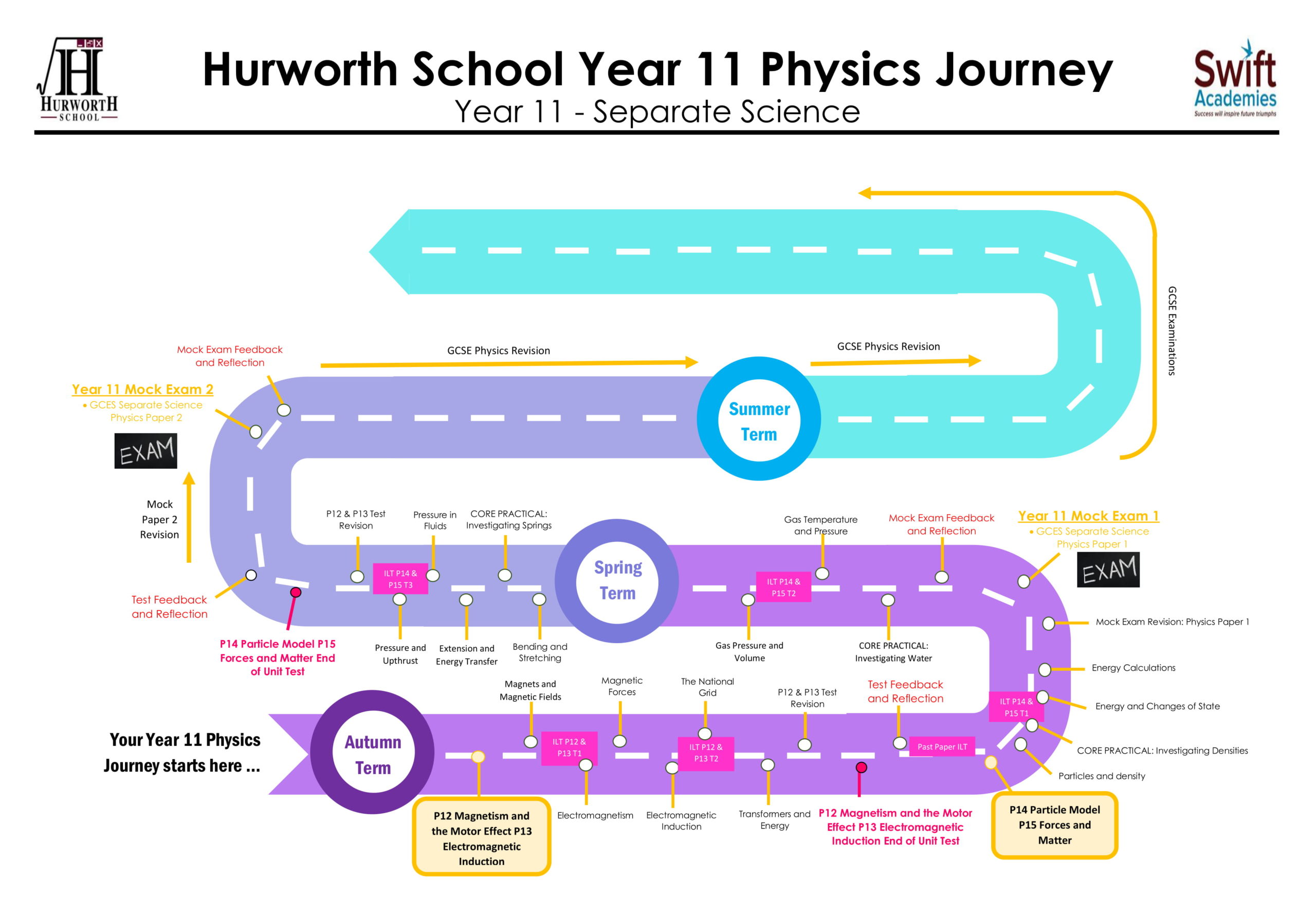
Combined Science
Year 10
Exam Specification
GCSE Science Edexcel Specification
Learning Outcomes
The Year 10 Combined Science scheme of learning builds on topics covered at KS3 to prepare students for the Year 11 GCSE exams in Biology, Chemistry and Physics, as well as related courses and careers at post-16.
Students complete Core Practical investigations which aim to develop a deeper understanding of how to carry out a Scientific investigation and how to use technical equipment with precision.
Students build on the Mathematics previously applied to Science with more challenging content.
Science knowledge gained across Year 9 and Year 10 is interleaved to allow students to remember more key content that has been previously covered in lessons.
Students further increase their Science vocabulary and develop their confidence to apply this language when answering exam style questions.
Topics Taught
Autumn Term
Spring Term
Spring Term
Biology
• Genetics
• Natural Selection and Genetic Modification
• Health Disease and the Development of Medicine
- Plant Structures and their Functions
• Ecosystems and Material Cycles
Chemistry
• Ionic Bonding
• Covalent Bonding
• Types of Substance
• Acids and Alkalis
• Calculations Involving Masses
• Electrolytic Processes
• Obtaining and Using Metals
• Reversible Reactions and Equilibria
• Groups in the Periodic table
• Rates of Reaction
• Heat Energy Changes in Chemical Reactions
Physics
• Waves
• Light and the Electromagnetic Spectrum
• Radioactivity
• Energy Forces Doing Work
• Forces and their Effects
• Electricity and Circuits
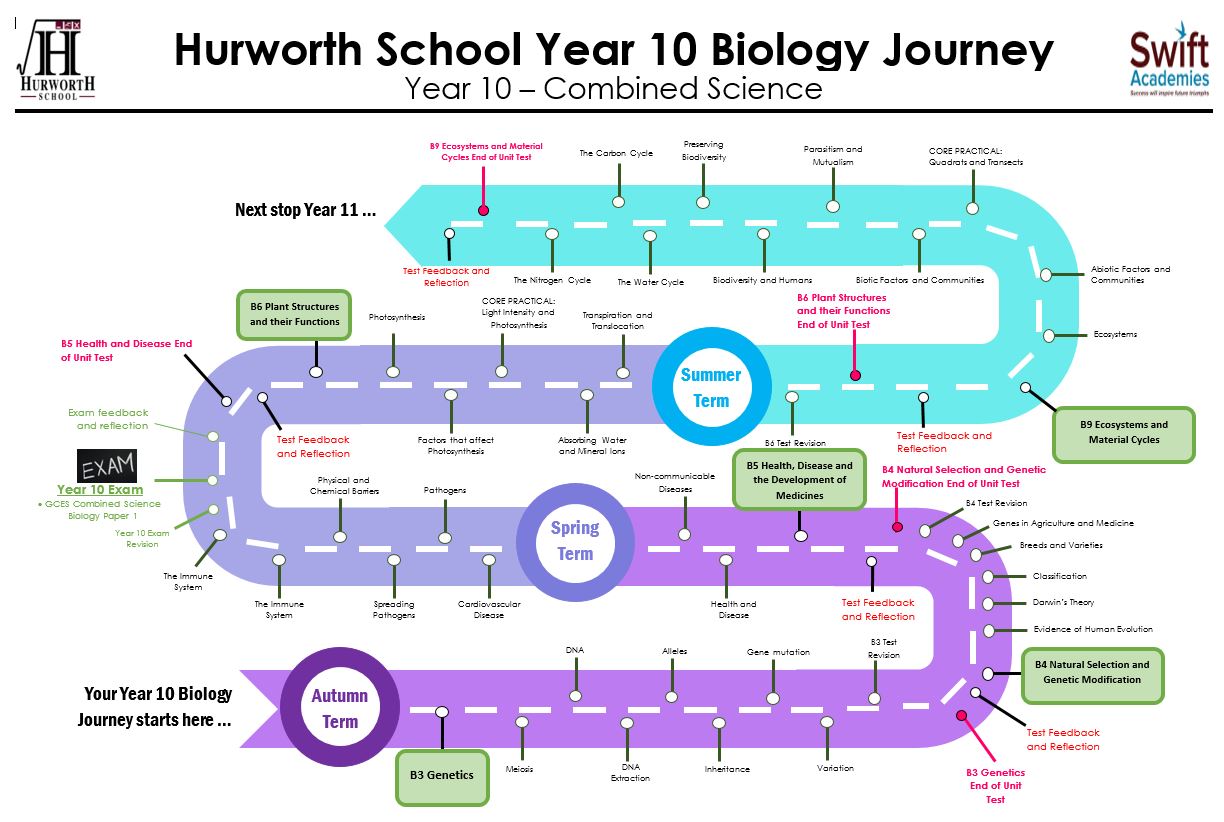
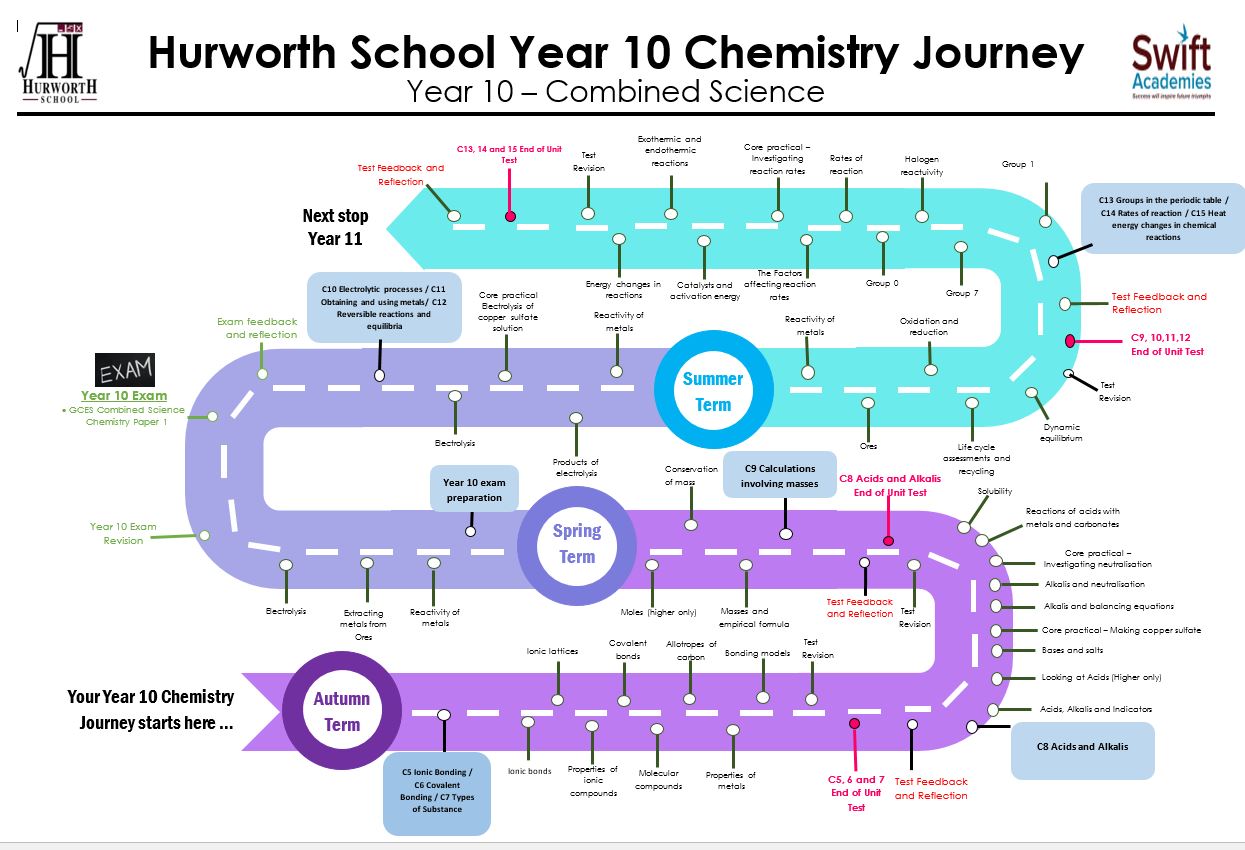
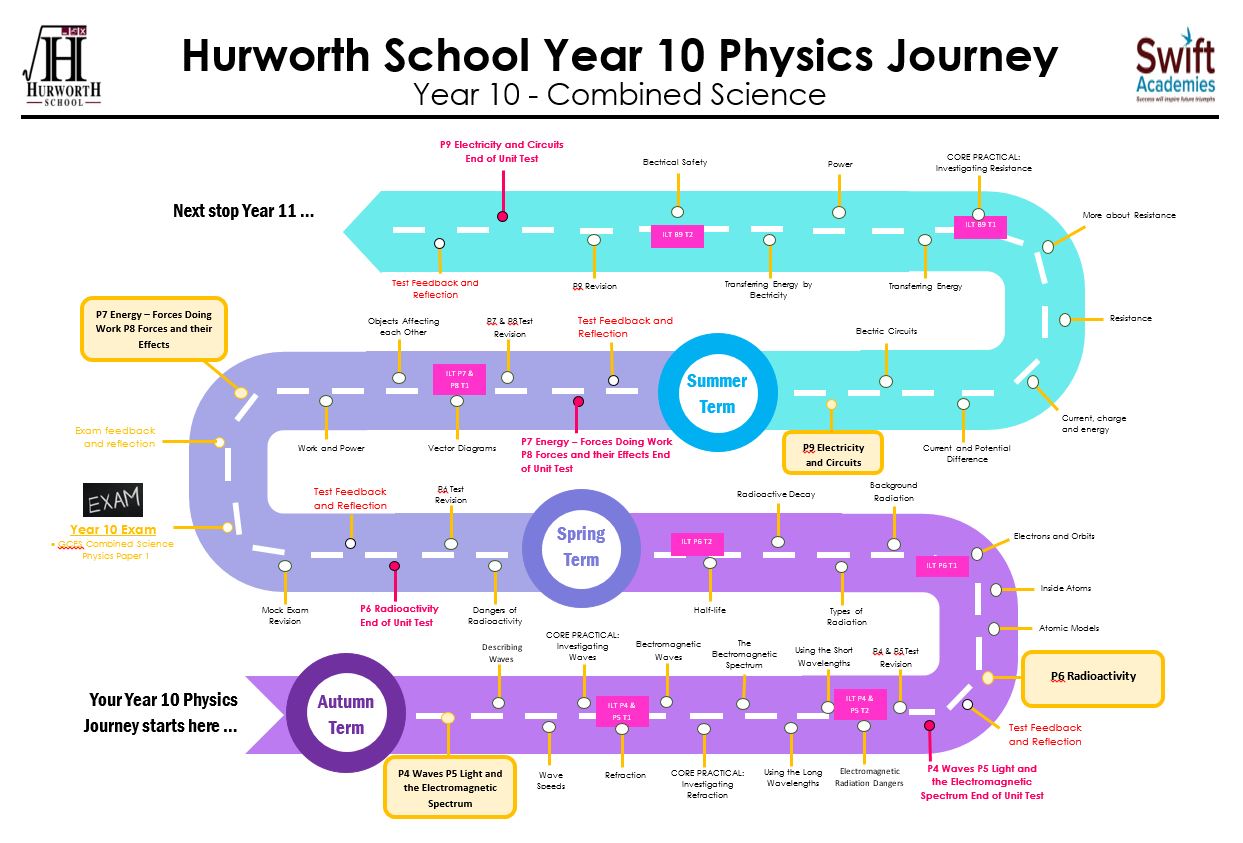
Year 11
Exam Specification
GCSE Science Edexcel Specification
Learning Outcomes
The Year 11 Combined Science scheme of learning allows the students to develop their knowledge of the final topics to be covered before the GCSE examinations, revise the content covered throughout Year 9 and Year 10 and deepen their understanding of these topics further.
Students complete the final Core Practical investigations and develop a deep understanding of the core principles of carrying out Scientific investigations. Students aim to have a good understanding of the technical equipment which they have used and how to use this equipment with precision.
Students build on the Mathematics previously applied to Science in Year 9 and 10 with the most challenging content.
Science knowledge gained across Year 9, 10 & 11 is interleaved to allow students to remember more key content that has been previously covered in lessons.
Students finalise their understanding of the Science vocabulary and hone their confidence to apply this language when answering exam style questions.
Topics Taught
Autumn Term
Spring Term
Spring Term
Biology
• Animal Coordination, Control and Homeostasis
Year 11 Mock Revision
Year 11 Mock Exams
• Exchange and Transport in Animals
Year 11 Mock Revision
Year 11 Mock Exams
GCSE EXAMS
Chemistry
• Acids and Alkalis Recap and Revision
• States of Matter Recap and Revision
• Methods of Separation and Purifying Substances Recap & Revision
Year 11 Mock Revision
Year 11 Mock Exams
• Fuels
• Earth and Atmospheric Science
Year 11 Mock Revision
Year 11 Mock Exams
GCSE EXAMS
Physics
• Magnetism and the Motor Effect
• Electromagnetic Induction
Year 11 Mock Revision
Year 11 Mock Exams
• Particle Model
• Forces and Matter
Year 11 Mock Revision
Year 11 Mock Exams
GCSE EXAMS
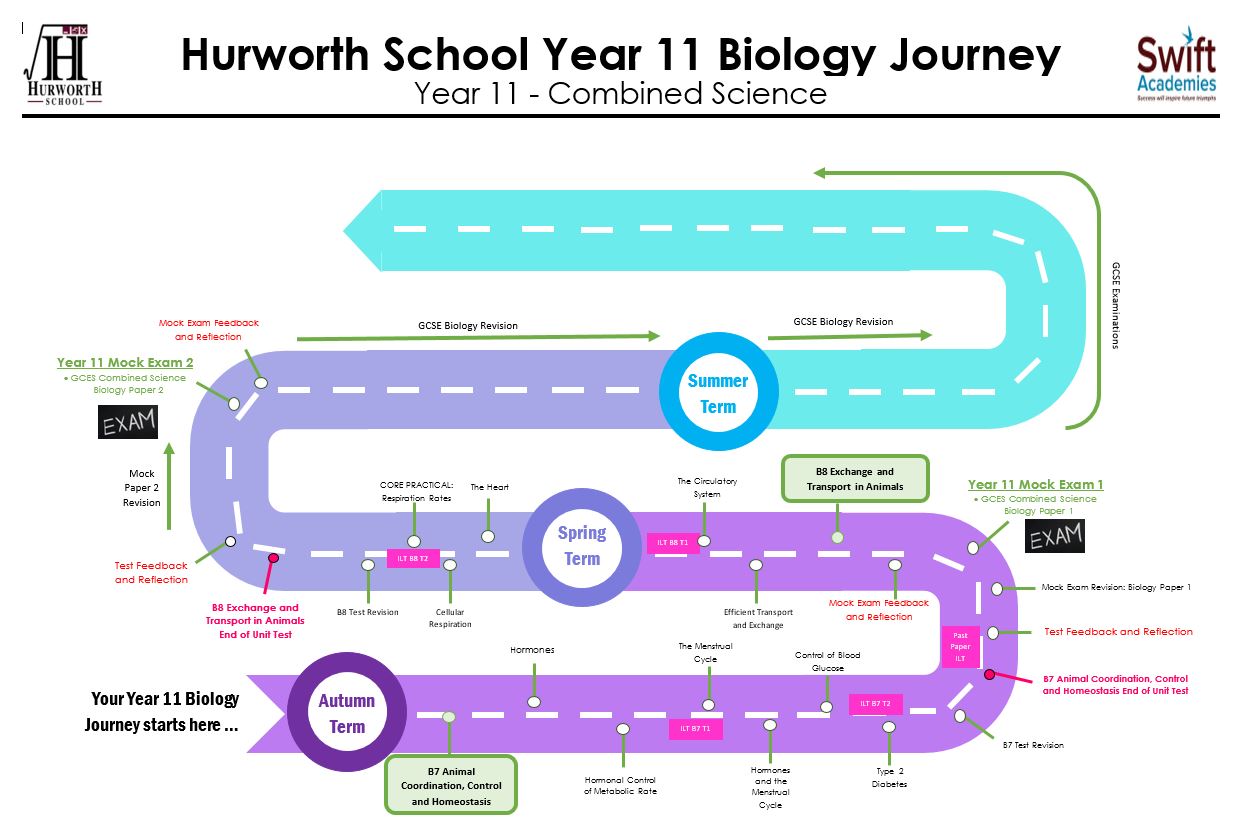
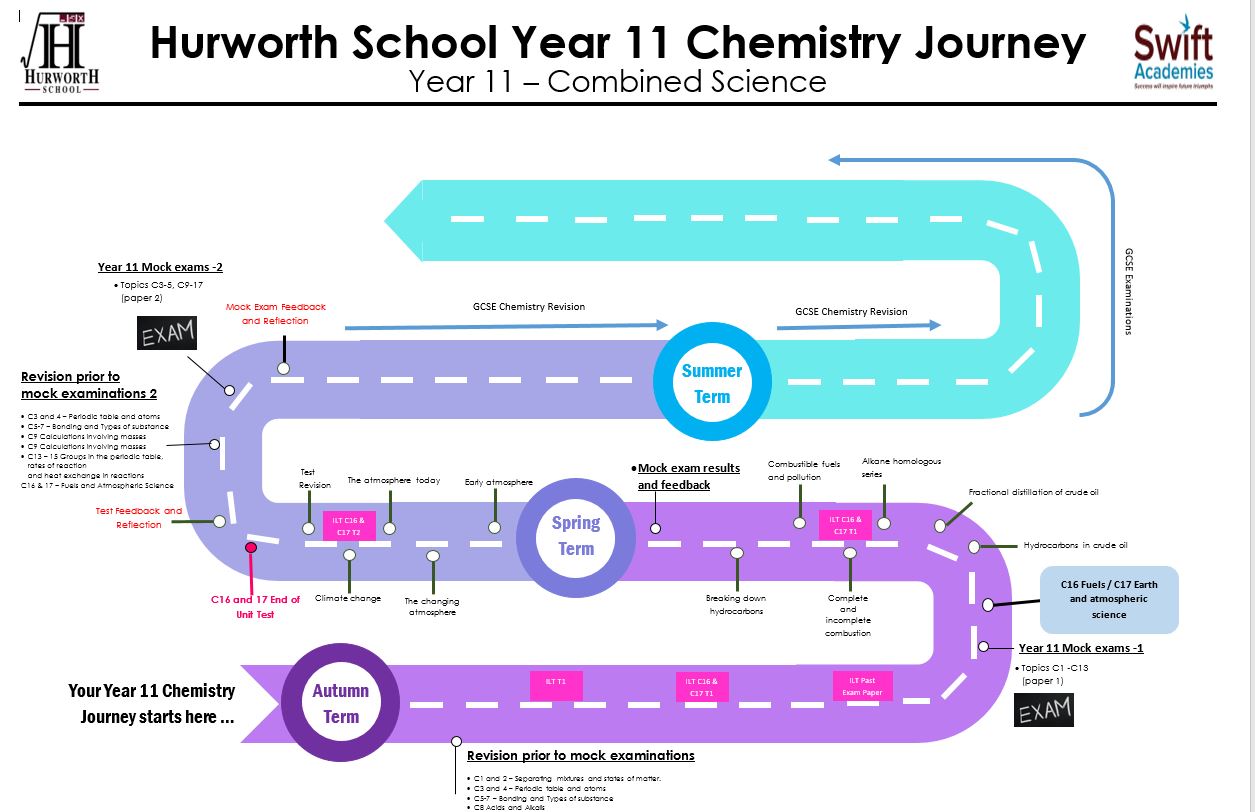
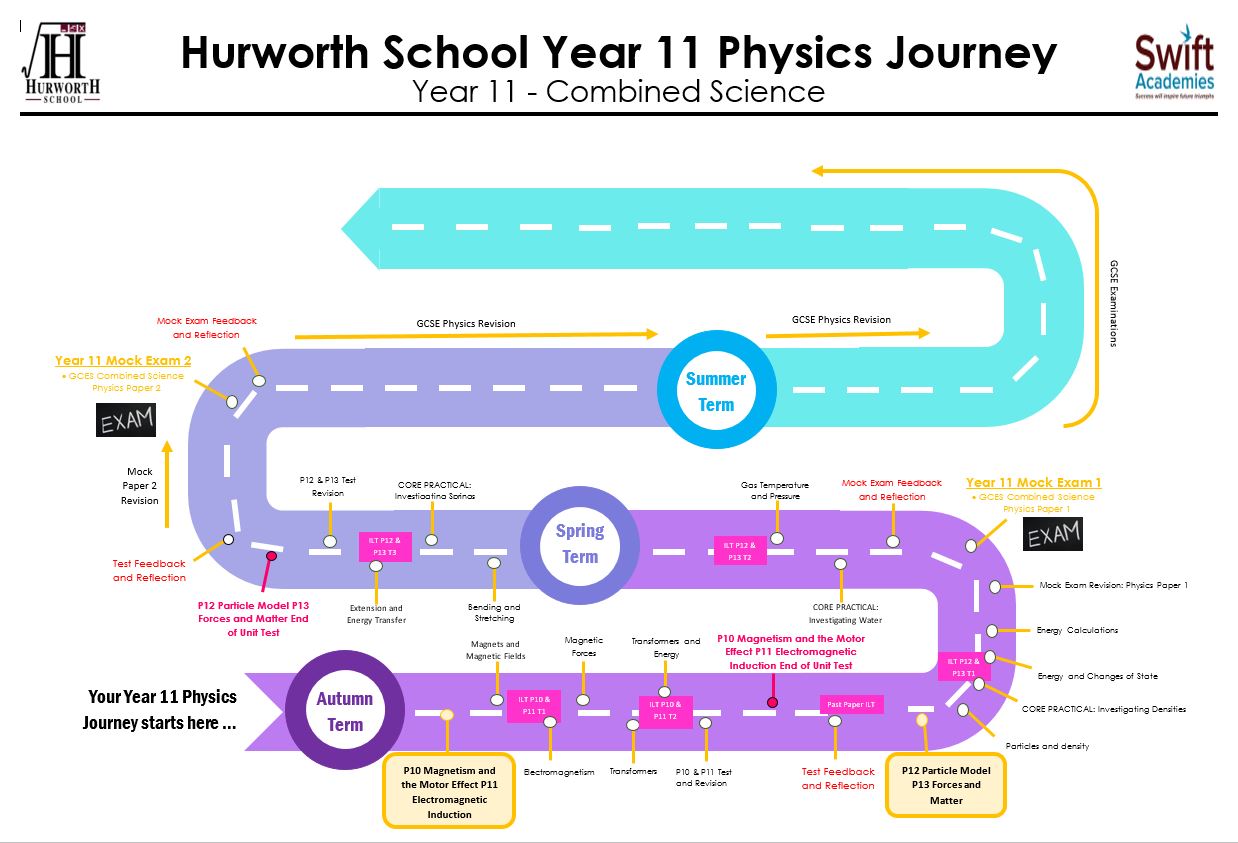
Science Clubs
Garden Club
A green-fingered genius or someone who just enjoys fresh air and the chance to dig in the mud?!
Garden club involves you looking after our school garden and includes everything from planning out what you’re going to plant where, keeping the weeds away while they grow and then getting to eat the produce afterwards! Over the winter we meet less often but there’s still lots to do such as making bird boxes for the wildlife part of the area or finding out about new habitats.
Garden Club runs every lunchtime during the summer and on selected lunchtimes over the winter. It is open to all Key Stage 3 pupils.
See Mrs Dell for more information.
Harry Potter Science Club
Were you disappointed that you didn’t get a Hogwarts’ Acceptance Letter? It’s not too late!
Harry Potter Science Club activities are all based around the themes of Magic and Spells from the books but with a twist, making them suitable for Muggles.
Harry Potter Science Club runs on Mondays from 3.30-4.30 p.m. and is open to all Year 7 pupils.
See Mrs Welch for more details.
Space Club
Space, the Final Frontier…
How big is Space? What is out there? How can we see what is in Space? We attempt to explore these questions, amongst others at Space Club.
Space Club runs on Tuesdays from 3.30 – 4.30 p.m. and is open to all Year 9 pupils.
See Mrs Welch for more information.


